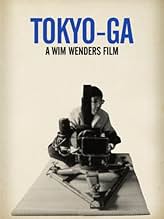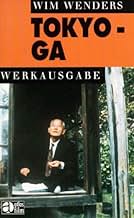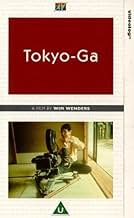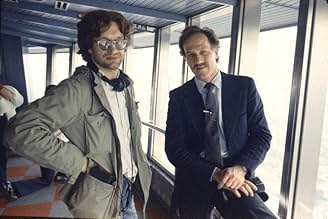Tokyo-Ga
- 1985
- 1h 32min
CALIFICACIÓN DE IMDb
7.3/10
3.9 k
TU CALIFICACIÓN
Agrega una trama en tu idiomaMoved by the work of director Yasujirô Ozu, Wim Wenders travels to Japan in search of the Tokyo seen in Ozu's films.Moved by the work of director Yasujirô Ozu, Wim Wenders travels to Japan in search of the Tokyo seen in Ozu's films.Moved by the work of director Yasujirô Ozu, Wim Wenders travels to Japan in search of the Tokyo seen in Ozu's films.
- Dirección
- Guionista
- Elenco
- Dirección
- Guionista
- Todo el elenco y el equipo
- Producción, taquilla y más en IMDbPro
Opiniones destacadas
Tokyo-Ga (1985) was written and directed by Wim Wenders. This full-length documentary is a tribute to Japanese director Yasujirô Ozu. It's included as a special feature in the Criterion Collection edition of Ozu's movie Late Spring.
Wenders is a talented German New Age director, who admired Ozu's work. He went to Tokyo to learn more about the city and about Ozu.
The movie has a real dichotomy. Wenders interviews actor Chishû Ryû and cinematographer Yûharu Atsuta at length. Ryû appeared in almost all of Ozu's films, and Atsuta was his chief camera operator.
Each of them (separately) tells the same story. Ozu knew what he wanted, and he was prepared to go to any lengths to get it. Neither man always understood what Ozu was thinking. They did what he told them to do. Sometimes Ozu was happy, sometimes he wasn't. Both men said that they couldn't understand why something was right or wrong. They kept doing the same scene until Ozu was satisfied. So, in a way, Ozu was a tyrant. However, he was a very polite and friendly tyrant, and he directed great film after great film. Both men are firm in their love and admiration for him.
The other part of the film consists of Wenders wandering through Tokyo and ending up at a pachinko parlor, a golf range, and a factory where they make plastic "food" items to be displayed in restaurant windows.
Wenders' view of Tokyo is that it's a harsh, overcrowded city with no charm. That's what he shows us. Of course, no one can capture a city in part of one documentary. Possibly another director would give us a different view.
I think this documentary is worth seeing if you want to learn more about how Ozu worked and how he accomplished as much as he did. It's also interesting to see a foreigner's view of this city of nine million people. It's certainly not a must-see movie, but I'm glad I saw it.
Tokyo-Ga has a solid 7.4 IMDb rating. I thought it was even better than that, and rated it 9.
Wenders is a talented German New Age director, who admired Ozu's work. He went to Tokyo to learn more about the city and about Ozu.
The movie has a real dichotomy. Wenders interviews actor Chishû Ryû and cinematographer Yûharu Atsuta at length. Ryû appeared in almost all of Ozu's films, and Atsuta was his chief camera operator.
Each of them (separately) tells the same story. Ozu knew what he wanted, and he was prepared to go to any lengths to get it. Neither man always understood what Ozu was thinking. They did what he told them to do. Sometimes Ozu was happy, sometimes he wasn't. Both men said that they couldn't understand why something was right or wrong. They kept doing the same scene until Ozu was satisfied. So, in a way, Ozu was a tyrant. However, he was a very polite and friendly tyrant, and he directed great film after great film. Both men are firm in their love and admiration for him.
The other part of the film consists of Wenders wandering through Tokyo and ending up at a pachinko parlor, a golf range, and a factory where they make plastic "food" items to be displayed in restaurant windows.
Wenders' view of Tokyo is that it's a harsh, overcrowded city with no charm. That's what he shows us. Of course, no one can capture a city in part of one documentary. Possibly another director would give us a different view.
I think this documentary is worth seeing if you want to learn more about how Ozu worked and how he accomplished as much as he did. It's also interesting to see a foreigner's view of this city of nine million people. It's certainly not a must-see movie, but I'm glad I saw it.
Tokyo-Ga has a solid 7.4 IMDb rating. I thought it was even better than that, and rated it 9.
Tokyo-Ga is a 1985 documentary film directed by Wim Wenders about filmmaker Yasujiro Ozu. Wenders travels to Japan and narrates the movie as he explores the world of Ozu, alternating scenes where he observes Japan and culture with interviews with crew and cast-members from Ozu's films. Wim Wenders says, "If in our century something sacred still existed
if there were something like a sacred treasure of the cinema, then for me that would have to be the work of the Japanese director, Yasujiro Ozu. He made fifty-four films. Silent films in the Twenties, black-and-white films in the Thirties and Forties, and finally color films until his death on December 12th, 1963, on his sixtieth birthday. As thoroughly Japanese as they are, these films are, at the same time, universal. In them, I've been able to recognize all families, in all the countries of the world, as well as my parents, my brother and myself. For me, never before and never again since has the cinema been so close to its essence and its purpose: to present an image of man in our century, a usable, true and valid image, in which he not only recognizes himself but from which, above all, he may learn about himself. Ozu's work does not need my praise and such a sacred treasure of the cinema could only reside in the realm of the imagination. And so, my trip to Tokyo was in no way a pilgrimage. I was curious as to whether I still could track down something from this time, whether there was still anything left of this work. Images perhaps, or even people
Or whether so much would have changed in Tokyo in the twenty years since Ozu's death that nothing would be left to find.
I'm not much attuned to Wenders or Ozu (whom Wenders hopes to rediscover with this). But I am very much attuned to Japan and their entire cosmology - their cultural images form one of the most sophisticated readings of the world. Their tea-house and the creative process that surrounds it is one of my three most valuable narratives (meant loosely).
It is with Ozu that Wenders is blessed with a unique entry into that entire cosmology. Sure, he comes to Japan consciously looking for that entry, but he is so busy looking for it in the most superficial way that he completely misses. Where is Ozu's Japan? Obviously gone, with time and modernity. The sprawling megapolis refutes the quiet, provincial life of Ozu's cinema, but that's hardly worth the insight.
That uniquely fortunate entry which Wenders misses, Ozu transmits from beyond the grave. It is actually inscribed on his gravestone, where in place of any other signifier we find the ideogram for "Mu", meaning "not" or "nothing", which is at the heart of the koan on emptiness - known as the "MU!" koan - so important in the teachings of the Rinzai Zen school.
Wenders being so utterly a stranger in all of this, so deeply embedded in his Western worldview, he starts rattling off a painfully flaccid diatribe on our perception of reality, as shaped by cinema and otherwise. Pontificating, banal notions that 'everything we see is ours', which is another example that filmmakers, however talented with images, are usually very poor commentators on their chosen field.
He is so completely out-of-tune with the importance of Ozu's gravestone lesson - which should have been his portal of understanding of the Japanese world - that he concludes said diatribe with the notion that cinema now is empty, "mu", whereas in Ozu's films it teemed with life and truth. The idea that emptiness is the true essence of form, and that by extension Ozu's ethos flows from that assurance, completely escapes him.
Had he understood that, he could have perhaps unlocked the meaning of the images of Japanese life he captures; the group of teenagers in a park drenched in the fashions and sounds of 50's America, or the food artists preparing from wax, in tremendous detail of shape and color, exact replicas of dishes to be displayed in a restaurant's window-shop. It is all about this concentrated, joyous work in form, as flowing from an empty-centeredness. So even though the kids dressed in rockabilly attire appear to be rebelling against everything that is culturally Japanese, the very expression of that rebellion - the precise, concentrated movements, the infatuation with movement itself - brings them at the heart of it.
But Wenders being Wenders, when faced with the players in an arcade parlor quietly lost in their noisy game of pachinko, he can only think that they are subsumed automaton-like by the machine. All these are merely the scenes of some indecipherable cultural gap for him.
So the essay on cinematic reality is really poor, and he even chances to meet Chris Marker on a small bar called "La Jetee", then working on Sans Soleil about similar stuff. With the hindsight of what Soleil would grow to be, this seems even smaller. Elsewhere he is reunited so far from Germany with Herzog, in suit and tie himself so far removed from his jungles. He goes on about his own thing about pure images, which in his films always flow out from the physical landscape. So it's natural that he thinks those images are impossible to find in the artifice of modern Tokyo - yet I posit that the fascinating work of the food artists constructing replicas of tofu and icecream is exactly the pure image. But not Wagnerian enough for Herzog.
What is left, and what is usually really good with Wenders, is the beauty of images tied into space. Here the electric night of the big city. He's at least attuned to the visible fabric, with a natural eye for how to synthesize it into a pervasive mood, even when he's pretty daft about the mechanisms invisible to the eye that control it. As a filmmaker he looks wonderfully, but doesn't really see.
So the stuff about Ozu don't interest me overmuch and I haven't commented on that, but everyone who is a fan should see the interview with Ozu's longtime cameraman. He reveals precious tidbits of the working ethos that informs his work. We see him enact how he setup those tatami shots for Ozu.
It is with Ozu that Wenders is blessed with a unique entry into that entire cosmology. Sure, he comes to Japan consciously looking for that entry, but he is so busy looking for it in the most superficial way that he completely misses. Where is Ozu's Japan? Obviously gone, with time and modernity. The sprawling megapolis refutes the quiet, provincial life of Ozu's cinema, but that's hardly worth the insight.
That uniquely fortunate entry which Wenders misses, Ozu transmits from beyond the grave. It is actually inscribed on his gravestone, where in place of any other signifier we find the ideogram for "Mu", meaning "not" or "nothing", which is at the heart of the koan on emptiness - known as the "MU!" koan - so important in the teachings of the Rinzai Zen school.
Wenders being so utterly a stranger in all of this, so deeply embedded in his Western worldview, he starts rattling off a painfully flaccid diatribe on our perception of reality, as shaped by cinema and otherwise. Pontificating, banal notions that 'everything we see is ours', which is another example that filmmakers, however talented with images, are usually very poor commentators on their chosen field.
He is so completely out-of-tune with the importance of Ozu's gravestone lesson - which should have been his portal of understanding of the Japanese world - that he concludes said diatribe with the notion that cinema now is empty, "mu", whereas in Ozu's films it teemed with life and truth. The idea that emptiness is the true essence of form, and that by extension Ozu's ethos flows from that assurance, completely escapes him.
Had he understood that, he could have perhaps unlocked the meaning of the images of Japanese life he captures; the group of teenagers in a park drenched in the fashions and sounds of 50's America, or the food artists preparing from wax, in tremendous detail of shape and color, exact replicas of dishes to be displayed in a restaurant's window-shop. It is all about this concentrated, joyous work in form, as flowing from an empty-centeredness. So even though the kids dressed in rockabilly attire appear to be rebelling against everything that is culturally Japanese, the very expression of that rebellion - the precise, concentrated movements, the infatuation with movement itself - brings them at the heart of it.
But Wenders being Wenders, when faced with the players in an arcade parlor quietly lost in their noisy game of pachinko, he can only think that they are subsumed automaton-like by the machine. All these are merely the scenes of some indecipherable cultural gap for him.
So the essay on cinematic reality is really poor, and he even chances to meet Chris Marker on a small bar called "La Jetee", then working on Sans Soleil about similar stuff. With the hindsight of what Soleil would grow to be, this seems even smaller. Elsewhere he is reunited so far from Germany with Herzog, in suit and tie himself so far removed from his jungles. He goes on about his own thing about pure images, which in his films always flow out from the physical landscape. So it's natural that he thinks those images are impossible to find in the artifice of modern Tokyo - yet I posit that the fascinating work of the food artists constructing replicas of tofu and icecream is exactly the pure image. But not Wagnerian enough for Herzog.
What is left, and what is usually really good with Wenders, is the beauty of images tied into space. Here the electric night of the big city. He's at least attuned to the visible fabric, with a natural eye for how to synthesize it into a pervasive mood, even when he's pretty daft about the mechanisms invisible to the eye that control it. As a filmmaker he looks wonderfully, but doesn't really see.
So the stuff about Ozu don't interest me overmuch and I haven't commented on that, but everyone who is a fan should see the interview with Ozu's longtime cameraman. He reveals precious tidbits of the working ethos that informs his work. We see him enact how he setup those tatami shots for Ozu.
Wim Wenders' praising, honest, confessional, hurriedly made and rather superficial love letter to the great Japanese filmmaker (and essential influence on WW's work) Yasujiro Ozu. This documentary intermingles some footage of Ozu's Tokyo Monogatari (in a bad copy, which is really a disservice to Ozu's art!); highly reverent interviews with Ozu's signature actor Chishu Ryu and longtime cameraman Yuharu Atsuta, both in their eighties but remarkably keen; and Wenders' own discovery (it's his first time there) of a high-tech, overcrowded, Americanized Tokyo, radically different from WW's preconceived image of an almost provincial post-war Tokyo that he had idealized through Ozu's films.
There are beautiful images by great cameraman Ed Lachman, especially the night shots; but overall it's pretty much familiar territory: trains (old trains, new trains, bullet trains), the overcrowded subway, the concrete jungle, the neon signs, the "copycat" fetishism (fake food, fake golf, fake rock'n'roll), baseball games, the video game mania, Japanese politeness, Japanese formality, Japanese impenetrability. It's a traveling journal, narrated by WW himself, where insightful and obvious remarks come in turns. It's a film with too few highlights (Atsuta's interview, Werner Herzog's maniac speech about his search for "clean, pure images"), and inevitably superficial: like all big towns, Tokyo can't be covered and deciphered by a first-timer; and like all great artists, Ozu's unique universe can't be grasped by a couple of interviews, anecdotes or images. When WW talks about Ozu's art, he's of course telling us about himself and his own cinema.
There's a telling sequence, where WW gets to meet French filmmaker Chris Marker in a Tokyo night-bar called "La Jetée" (the title of Marker's landmark 1962 science-fiction/photo-poem short). Marker - who spent considerable time in Japan over the years -- put Tokyo and Japanese culture at the center of one of the most brilliant personal essays/ journals ever filmed, the incomparable "Sans Soleil" (1982). At one point, WW mentions that "Sans Soleil" is filled with "images of Japan not allowed to foreigners like me". Hence my suggestion: if you want to know more about Ozu, watch his films; if you want to see a revealing, knowledgeable essay by a Westerner on Japan, pass on "Tokyo-Ga" and try "Sans Soleil" instead; if you want a deeply insightful look into WW's work, read the great essay on WW "Eyes Can't Be Bought" by Peter Buchka.
There are beautiful images by great cameraman Ed Lachman, especially the night shots; but overall it's pretty much familiar territory: trains (old trains, new trains, bullet trains), the overcrowded subway, the concrete jungle, the neon signs, the "copycat" fetishism (fake food, fake golf, fake rock'n'roll), baseball games, the video game mania, Japanese politeness, Japanese formality, Japanese impenetrability. It's a traveling journal, narrated by WW himself, where insightful and obvious remarks come in turns. It's a film with too few highlights (Atsuta's interview, Werner Herzog's maniac speech about his search for "clean, pure images"), and inevitably superficial: like all big towns, Tokyo can't be covered and deciphered by a first-timer; and like all great artists, Ozu's unique universe can't be grasped by a couple of interviews, anecdotes or images. When WW talks about Ozu's art, he's of course telling us about himself and his own cinema.
There's a telling sequence, where WW gets to meet French filmmaker Chris Marker in a Tokyo night-bar called "La Jetée" (the title of Marker's landmark 1962 science-fiction/photo-poem short). Marker - who spent considerable time in Japan over the years -- put Tokyo and Japanese culture at the center of one of the most brilliant personal essays/ journals ever filmed, the incomparable "Sans Soleil" (1982). At one point, WW mentions that "Sans Soleil" is filled with "images of Japan not allowed to foreigners like me". Hence my suggestion: if you want to know more about Ozu, watch his films; if you want to see a revealing, knowledgeable essay by a Westerner on Japan, pass on "Tokyo-Ga" and try "Sans Soleil" instead; if you want a deeply insightful look into WW's work, read the great essay on WW "Eyes Can't Be Bought" by Peter Buchka.
This had been on my watchlist for ages, but after watching the excellent Perfect Days, it became a top priority. Both have Wim Wenders exploring Japan, though Tokyo-Ga is a documentary, and one with a surprising focus on Yasujiro Ozu. When Wenders is focused on Ozu, and interviewing people who knew the legendary filmmaker, I think Tokyo-Ga is at its best.
There are other sections dedicated to just exploring technology and life in Japan, but these parts come up a little short at times. Wenders' narration can feel a little surface-level at times, or at least not as exceptional as Werner Herzog's would be, if he handled a film like this (he does have a cameo appearance here though, which was cool).
It's a pretty good watch. It doesn't do for the documentary genre what Perfect Days does for non-documentary films, by any means, but it's still fairly good for what it is, and was relatively interesting to me throughout.
There are other sections dedicated to just exploring technology and life in Japan, but these parts come up a little short at times. Wenders' narration can feel a little surface-level at times, or at least not as exceptional as Werner Herzog's would be, if he handled a film like this (he does have a cameo appearance here though, which was cool).
It's a pretty good watch. It doesn't do for the documentary genre what Perfect Days does for non-documentary films, by any means, but it's still fairly good for what it is, and was relatively interesting to me throughout.
¿Sabías que…?
- Citas
Wim Wenders: It felt good just to look out the window. If only it were possible to film like that, I thought to myself, like when you open your eyes sometimes just to look without wanting to prove anything.
- ConexionesFeatured in De zee die denkt (2000)
Selecciones populares
Inicia sesión para calificar y agrega a la lista de videos para obtener recomendaciones personalizadas
- How long is Tokyo-Ga?Con tecnología de Alexa
Detalles
- Fecha de lanzamiento
- Países de origen
- Idiomas
- También se conoce como
- Tokyo Ga
- Locaciones de filmación
- Productoras
- Ver más créditos de la compañía en IMDbPro
Contribuir a esta página
Sugiere una edición o agrega el contenido que falta























